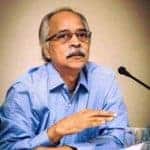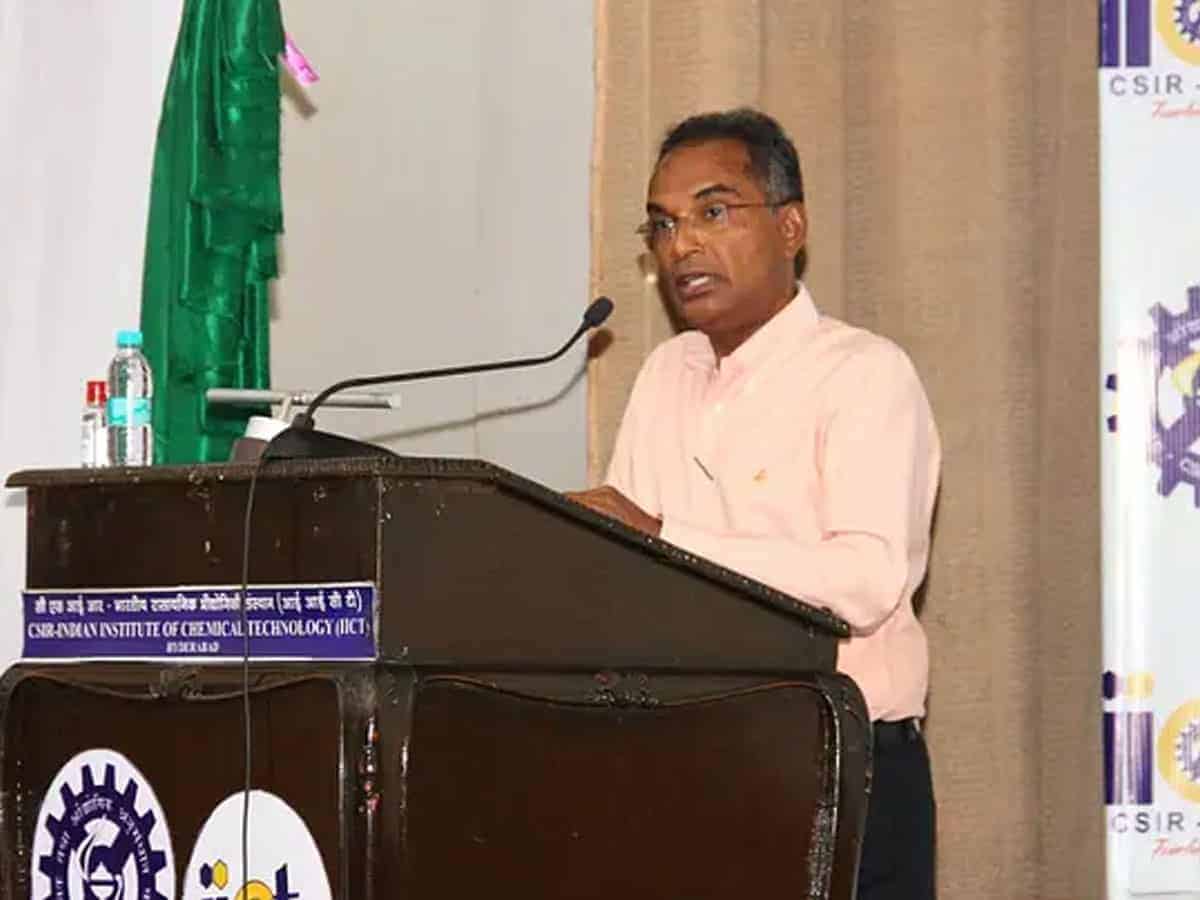
“Extracting water from thin air”! Yes, it’s not just a saying but a proven technology now.
It was in early 2019 that Maithri Aquatech, a Hyderabad-based company set up a demonstration plant in the campus of the CSIR-Indian Institute of Chemical Technology (IICT).
The company’s Chief Ramakrishna and team explained the process of producing potable water from the machine. Their efforts were supported by the IICT Director, Dr S Chandrasekhar and other scientists of the laboratory. Today, Maithri Aquatech produces potable water and machines that are exported to a few foreign countries too.
It was an occasion to have a detailed discussion with the Director, IICT and the various technology and industry collaboration projects of the laboratory for me after a long gap. Ramakrishna and Dr Arun Tiwari, co-author with former President APJ Abdul Kalam of the autobiographical work, Wings of Fire, were also part of the discussion.
Therefore, when the announcement came on December 4 that S Chandrasekhar, a technologist-leader, was appointed as the Secretary, Union Department of Science and Technology (DST), under the Ministry of Science and Technology, it was exciting news to me.
Passionate about technology development, patents and industrial collaboration Dr Chandrasekhar is enterprising, proactive bordering on restlessness and open to new ideas. These traits should stand him in good stead and also turn testing in the bureaucracy ridden DST, which he needs to steer. The DST, which is mainly a funding body with focus on promoting indigenous technologies and forging Industry-Institute projects that meet national needs and also cutting edge for the future.
Having missed becoming the Director General of the CSIR (parent organisation of IICT) narrowly in 2020, Dr Chandrasekhar has just two years to prove his mettle and make a mark in the big responsibility he has been vested with. He has gained experience as Director of IICT since 2015. In addition, he had held responsibility for couple of more labs like the NGRI, NEERI, Nagpur, NCL, Pune and CMSCRI, Bhavnagar.
The task ahead will not be easy for Dr Chandrasekhar as the Modi Government has been tough on research, science & technology funding and asking return on investments. Sections of scientists perceive the government as not very supportive of basic science and pushing into including ancient Indian, Vedic science, traditional and folklore based medicine etc., which need an organised, scientific pursuit and not random acceptance Union Ministers and BJP leaders have made statements citing ancient Indian wisdom and science that drew sharp criticism too.
From Osmania University to DST
The bespectacled, thin and medium built, 58 year old, Srivari Chandrasekhar is a product of Osmania University and a complete Hyderabadi. He did his graduation in Science from the Sardar Patel College, post graduation and PhD from the University Science College in the early 1980’s.
It is interesting to note that the last time a scientist from Hyderabad who was appointed DST Secretary was Dr Palle Rama Rao, way back in 1991. He was then the Director of the Defence Metallurgical Research Laboratory (DMRL). Dr Rama Rao went on to play major role in DST (1991-95), Defence and Atomic Energy sectors, as well as the Vice Chancellor of the University of Hyderabad.
On the other hand, scientists from Hyderabad and United Andhra Pradesh dominated the CSIR. Starting from Dr Hussain Zaheer, the founder Director of IICT (appointed in 1948, when it was the Central Laboratories for Scientific & Industrial Research, started by the Princely State of Hyderabad), who served as the DG between 1962 to 1966. He was succeeded by Dr Y Nayudamma, leather technologist (1971-77) and Dr G S Sidhu (1981-84).
IICT, COVID-19 & global alliances
Dr Chandrasekhar joined the IICT and completed his doctorate under Dr A V Rama Rao, Director (1985-95) who was instrumental in transforming the then Regional Research Laboratory (RRL) into the IICT. It gave him opportunities to understand partnerships with industries in collaborative research.
He moved to the US and did a three year stint as a Post Doctoral Fellow at the University of Texas Southwestern Medical Center. He returned to CSIR-IICT in 1994. He is also an Alexander Von Humboldt Fellow. During the next 21 years, as a synthetic organic chemist with 290 publications and 19 patents, he steadily rose up the ranks to the Director’s position in 2015.
As Director, he has initiated several national projects. One of them is developing Innovative Processes &Technologies for Indian Pharmaceutical and Agrochemical Sector Industries (INPROTICS-Pharma and Agro) wherein 15 important Active Pharmaceutical Ingredients (APIs) have been developed thus reducing imports.
During COVID-19, Dr Chandrasekhar the IICT focussed on developing cost-effective synthetic routes for APIs with a focus on COVID-19 treatment. Over 15 generic APIs are currently being repurposed for the mitigation of this pandemic. The lab helped CIPLA develop a version of Favipiravir.
The various initiatives on COVID-19 related work got recognition when a team led by Chandrasekhar received the CSIR Technology Award 2021 in the life sciences category for contributing to the development of “a cost-effective and scalable process for the synthesis of a molecule used as an adjuvant” in Covaxin, the Vaccine developed by Bharat Biotech.
Drawing on his international experience, Dr Chandrasekhar has built joint programmes with Australia, France, Russia, USA, South Korea, Germany, Japan and UK and Africa. The Indo-French joint laboratory, built in IICT in collaboration with CNRS, France, is considered as a role model laboratory for partnerships. CSIR-IICT and RMIT, Australia also run a similar laboratory where students get PhD from RMIT, Australia. IICT also hosts start-ups on campus and provides mentorship.
Active role in Telangana Science Academy and Pharma:
Dr Chandrasekhar is an advisor to Telangana State Government providing guidance on the development of India’s largest pharma city, spread over 1800 acres, which has been in the works for the past 6-7 years on the outskirts of Hyderabad. A winner of many national awards, he was honoured by the Telangana Government in 2017 as Eminent Scientist.
He played an important role in the formation and activities of the Telangana Akademy of Sciences post the formation of the State in 2014 as it transitioned from the erstwhile Andhra Pradesh Akademi of Sciences, says Arun Tiwari. He is the honorary Secretary of the Academy.
Somasekhar Mulugu, former Associate Editor & Chief of Bureau of The Hindu BusinessLine, is a well-known political, business and science writer and analyst based in Hyderabad

